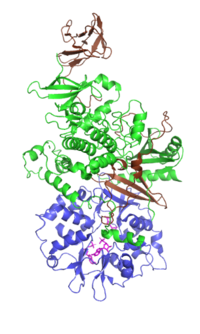
Recent advances in nanodisc technology for membrane protein studies (2012–2017)
Sign Up to like & getrecommendations! Published in 2017 at "FEBS Letters"
DOI: 10.1002/1873-3468.12706
Abstract: Historically, the main barrier to membrane protein investigations has been the tendency of membrane proteins to aggregate (due to their hydrophobic nature), in aqueous solution as well as on surfaces. The introduction of biomembrane mimetics… read more here.
Keywords: membrane proteins; microscopy; membrane protein; recent advances ... See more keywords

The peroxisome biogenesis factors Pex3 and Pex19: multitasking proteins with disputed functions
Sign Up to like & getrecommendations! Published in 2019 at "FEBS Letters"
DOI: 10.1002/1873-3468.13340
Abstract: The peroxisomal membrane protein (PMP) Pex3 and its cytosolic interaction partner Pex19 have been implicated in peroxisomal membrane biogenesis. Although these peroxins have been extensively studied, no consensus has been reached yet on how they… read more here.
Keywords: biogenesis factors; peroxisomal membrane; pex3 pex19; peroxisome biogenesis ... See more keywords

Sticholysin I–II oligomerization in the absence of membranes
Sign Up to like & getrecommendations! Published in 2022 at "FEBS Letters"
DOI: 10.1002/1873-3468.14326
Abstract: Sticholysins are pore‐forming toxins produced by the sea anemone Stichodactyla helianthus. When they encounter a sphingomyelin‐containing membrane, these proteins bind to it and oligomerize, a process that ends in pore formation. Mounting evidence indicates that StnII… read more here.
Keywords: oligomerization; oligomerization absence; absence membranes; membrane ... See more keywords

On the role of ubiquinone in the proton translocation mechanism of respiratory complex I
Sign Up to like & getrecommendations! Published in 2022 at "FEBS Letters"
DOI: 10.1002/1873-3468.14506
Abstract: Complex I converts oxidoreduction energy into a proton electrochemical gradient across the inner mitochondrial or bacterial cell membrane. This gradient is the primary source of energy for aerobic synthesis of ATP. Oxidation of reduced nicotinamide… read more here.
Keywords: proton translocation; translocation; role ubiquinone; membrane ... See more keywords

Vacuole membrane contact sites regulate liquid-ordered domain formation during glucose starvation.
Sign Up to like & getrecommendations! Published in 2023 at "FEBS letters"
DOI: 10.1002/1873-3468.14621
Abstract: Liquid-ordered (Lo) membrane domains have been proposed to play important roles in a wide variety of biological processes, such as protein sorting and cell signaling. However, the mechanisms by which they are formed and maintained… read more here.
Keywords: glucose starvation; contact sites; membrane contact; domain formation ... See more keywords

Suppressed de novo lipogenesis by plasma membrane citrate transporter inhibitor promotes apoptosis in HepG2 cells
Sign Up to like & getrecommendations! Published in 2018 at "FEBS Open Bio"
DOI: 10.1002/2211-5463.12435
Abstract: Suppression of the expression or activities of enzymes that are involved in the synthesis of de novo lipogenesis (DNL) in cancer cells triggers cell death via apoptosis. The plasma membrane citrate transporter (PMCT) is the… read more here.
Keywords: citrate; apoptosis; hepg2 cells; pmcti ... See more keywords

Glycosphingolipids within membrane contact sites influence their function as signaling hubs in neurodegenerative diseases.
Sign Up to like & getrecommendations! Published in 2023 at "FEBS open bio"
DOI: 10.1002/2211-5463.13605
Abstract: Intracellular organelles carry out many of their functions by engaging in extensive inter-organellar communication through specialized membrane contact sites (MCSs) formed where two organelles tether to each other or to the plasma membrane without fusing.… read more here.
Keywords: contact sites; membrane contact; signaling hubs; membrane ... See more keywords

Trypsin‐Free Cultivation of 3D Mini‐Tissues in an Adaptive Membrane Bioreactor
Sign Up to like & getrecommendations! Published in 2020 at "Advanced Biosystems"
DOI: 10.1002/adbi.202000081
Abstract: The production of large scaffold‐free tissues is a key challenge in regenerative medicine. Nowadays, temperature‐responsive polymers allow intact tissue harvesting without needing proteolytic enzymes. This method is limited to tissue culture plastic with limited upscaling… read more here.
Keywords: medicine; cultivation; membrane bioreactor; trypsin free ... See more keywords

Multilayered Lipid Membrane Stacks for Biocatalysis Using Membrane Enzymes
Sign Up to like & getrecommendations! Published in 2017 at "Advanced Functional Materials"
DOI: 10.1002/adfm.201606265
Abstract: Multilayered or stacked lipid membranes are a common principle in biology and have various functional advantages compared to single lipid membranes, such as their ability to spatially organize processes, compartmentalize molecules and greatly increase surface… read more here.
Keywords: lipid membrane; lipid membranes; microscopy; membrane enzymes ... See more keywords

Solid‐State Hybrid Fibrous Supercapacitors Produced by Dead‐End Tube Membrane Ultrafiltration
Sign Up to like & getrecommendations! Published in 2017 at "Advanced Functional Materials"
DOI: 10.1002/adfm.201606461
Abstract: The development of flexible supercapacitors with high volumetric performance is critically important for portable electronics applications, which are severely volume limited. Here, dead-end tube membrane (DETM) ultrafiltration is used to produce densely compacted carbon-nanotube/graphene fibrous… read more here.
Keywords: solid state; membrane; end tube; dead end ... See more keywords

Fabrication of Nanoporous Alumina Ultrafiltration Membrane with Tunable Pore Size Using Block Copolymer Templates
Sign Up to like & getrecommendations! Published in 2017 at "Advanced Functional Materials"
DOI: 10.1002/adfm.201701756
Abstract: Control over nanopore size and 3D structure is necessary to advance membrane performance in ubiquitous separation devices. Here, inorganic nanoporous membranes are fabricated by combining the assembly of cylinder-forming poly(styrene-block-methyl methacrylate) (PS-b-PMMA) block copolymer and… read more here.
Keywords: block copolymer; block; pore size; size ... See more keywords